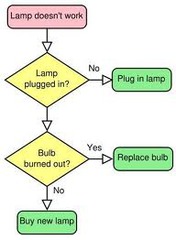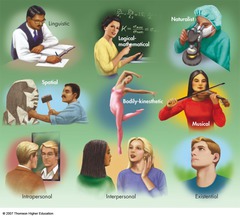General Psychology: Cognition and Intelligence/Motivation and Emotion/Gender and Sex – Flashcards
Unlock all answers in this set
Unlock answersquestion
Define Cognition
answer
Higher mental processes, how we understand the world process information, make judgements, decisions, and communicate
question
Define schema
answer
a framework that provides expectations about objects and situations
question
What is an algorithm?

answer
a formula that guarantees an answer
question
What are heuristics?
answer
guidelines for solving problems
question
Generate and Test
answer
Considering all of the possible answers to a solution and trying them
question
Hill climbing
answer
sticking to one possible answer to a solution, even if the answer is not sensible or right
question
Work backwards
answer
thinking of the solution, how to get there, and then how to get there and so on
question
Reason by analogy
answer
using the solutions and processes to previous problems to answer current ones
question
Confirmation Bias
answer
accepting information that proves what you believe, and disregarding information that disproves what you believe
question
Hindsight bias
answer
claiming that you knew the answer before it was said
question
Availability heuristic
answer
developing a schema based on similar or recent events
question
Base rate neglect
answer
ignoring potential consequences
question
Representative heuristic
answer
using preset ideals to define a schema (stereotypes)
question
Functional Fixedness

answer
not being able to find multiple functions for one object
question
Divergent thinking
answer
Finding multiple ways to solve problems (creative thinking)
question
Convergent thinking
answer
Using set singular ways to solve problems (logical thinking)
question
Brainstorming

answer
quickly listing random ideas to find a plausible solution
question
Define intelligence
answer
the capacity to understand the world, think rationally and use resources effectively when faced with challenges
question
According to Gatton, what are the two characteristics of intelligence?
answer
It is quantifiable and normally distributed
question
What did Binet and Simon create?

answer
The I.Q. test
question
What is Spearman's theory of intelligence?
answer
g-factor language, math, spatial and analytical all make up general intelligence
question
What is Sternberg's theory of intelligence?
answer
thiarctic theory 1. analytical 2. practical 3. creative
question
What is Gardner's theory of intelligence?

answer
nine types 1. linguistic 2. logical - math 3. visuospatial 4. musical 5. bodily - kinesthetic 6. interpersonal 7. intrapersonal 8. naturalistic 9. existential
question
Reliability
answer
consistency
question
Validity
answer
accuracy
question
Content Validity
answer
measures a specific domain
question
Criterion - related Validiy
answer
measures of how it relates to another variable
question
Cultural fair test
answer
strip out cultural bias
question
Achievement test
answer
level of knowledge of a specific domain
question
Aptitude test
answer
predicts ability in a particular area
question
Standardization
answer
procedures in administration and scoring
question
Norms
answer
a score relative to others
question
There are overall differences that appear to differ in overall intelligence (T/F)
answer
False
question
intelligence is not related to common sense (T/F)
answer
True
question
giftedness
answer
having a high IQ (usually about 130) or special talents or abilities
question
mild intellectual deficiency
answer
IQ between 55 and 69 and the ability to be independent
question
moderate intellectual deficiency
answer
IQ between 40 and 55, may live in a group home
question
severe intellectual deficiency
answer
IQ between 25 and 40 and difficulty in functioning independently
question
profound intellectual deficiency
answer
IQ between 0 and 25 and an inability to function independently
question
Causes of intellectual deficiency
answer
organic-genetics or brain damage cultural - familial-adverse sociocultural conditions
question
hypothalamus
answer
regulates hunger, thirst, motivation, emotion, and sex
question
motivation

answer
internal regulatory process of behavior
question
three components of motivation
answer
direction: what should i do? intensity: how hard should i try? persistence: should i keep going?
question
Instinct apporoach
answer
motivation for survival
question
Drive-reduction approach
answer
drive to achieve hemeostasis
question
Optimal arousal approach + Yerks-dodson law
answer
not wanting to be aroused too much or too little
question
Cognitive approach to motivation
answer
intrinsic: internal motivation (love and want) extrinsic: external motivation (money and avoiding punishment)
question
self determination
answer
competence relatedness autonomy
question
Psychoanalytic approach
answer
motivation is unconscious and based on aggression and sex
question
Humanistic approach to motivation
answer
motivated to achieve our maximum potential unless there are obstacles
question
Maslow: Hierarchy of Needs
answer
self-actualization aesthetic cognitive esteem love and belonging safety psychological
question
Physiological arousal (emotion)
answer
fight or flight/automatic nervous system
question
James-Lange Theory of Emotion
answer
Emotional feelings follow bodily arousal and come from awareness of such arousal
question
Cannon-Bard Theory of Emotion
answer
We have emotional feelings and bodily responses at the same time
question
Schachter and Singer's Two Factor Theory of Emotion
answer
Emotions occur when a label is applied to general physical arousal
question
Facial Feedback Hypothesis
answer
facial expression can influence emotions; in support of James-Lange
question
Comparative Perspectives
answer
expression of emotions similar across cultures; display rules do vary across cultures
question
Polygraph
answer
records heart rate, blood pressure, respiration, and skin response
question
Order of polygraph questions

answer
Irrelevant: neutral Control: anxiety provoking Relevant: only guilty should react
question
External Eating Cues
answer
external stimuli that tend to encourage hunger or elicit eating
question
taste aversion
answer
active dislike for a particular food this is very difficult to overcome
question
Anorexia Nervosa
answer
self-starvation or sustained loss of appetite
question
Bulimia nervosa
answer
excessive eating, self-induced vomiting, and/or taking laxatives
question
Sex
answer
Biological assignment to male or female
question
Gender
answer
Psychosocial construct of male or female
question
Gender Identity
answer
The gender that a person refers to themselves as
question
Androgynous
answer
having both masculine and feminine traits
question
Egalitarian
answer
genders are equal
question
Instrumentality
answer
masculine traits
question
Expressiveness
answer
feminine traits
question
Disorders of Sexual Development (DSD)
answer
The development of the chromosomal, gonal, anatomical, or sex is atypical
question
Transgender
answer
when a person's gender identity is not the same as the sex they were assigned at birth
question
Gender dysphoria
answer
the "disorder" that transgender individuals are diagnosed with there has been controversy if transgender individuals should be diagnosed at all
question
Sexual selection
answer
the differentiation between the male and female members of a species because of the differences between the two in competition and choice
question
gender-nonconforming behavior
answer
Individual engaging in behavior that doe not line up with the social "norms" of their gender
question
gender schema
answer
Mental framework for understanding what is considered appropriate behaviors for males in their culture
question
social role theory

answer
Eagly's theory of gender development that acknowledges the physical differences between the sexes that have historically influenced different tasks performed by men and women; points out the ways that these differences color social expectations and create social structures that limit opportunities for both sexes
question
gender roles
answer
roles that reflect the individual's expectation for how females and males should think, act, and feel
question
gender stereotypes
answer
overly general beliefs and expectations about what women and men are like
question
gender similarities hypothesis
answer
Hyde's proposition that men and women are much more similar than they are different
question
Overt aggression
answer
physically or verbally harming another person directly
question
rational aggression
answer
behavior that is meant to harm the social standing of another person
question
sexual scripts
answer
patterns of expectancies for how people should behave sexually
question
comprehensive sex education
answer
involves providing students with comprehensive knowledge about sexual behavior and protection
question
abstinence-only education
answer
sexual behavior before marriage is harmful
question
fetish
answer
an object or activity that arouses sexual interest and desire
question
paraphilic disorders
answer
sexual disorders that feature recurrent sexually arousing fantasies, urges, or behaviors involving nonhuman objects; the suffering or humiliation of oneself or one's partner; or children or other nonconsenting individuals
question
exhibitionistic disorder
answer
exposing one's genitals to a stranger
question
fetishistic disorder
answer
using nonliving objects for sexual pleasure
question
frotteuristic disorder
answer
touching and rubbing against a person who has not given consent
question
pedophilic disorder
answer
sexual activity with a prepubescent child
question
sexual masochism disorder
answer
acts is which the individual derives sexual excitement from being humiliated, beaten, bound, or otherwise made to suffer
question
sexual sadism disorder
answer
acts in which the individual derives sexual excitement from the psychological or physical suffering of the victim
question
transvestic disorder
answer
crossdressing by a man or woman that causes distress or interferes with daily functioning
question
voyeuristic disorder
answer
observing unsuspecting individuals, usually strangers, who are naked or in the process of disrobing or engaging in sexual activity



